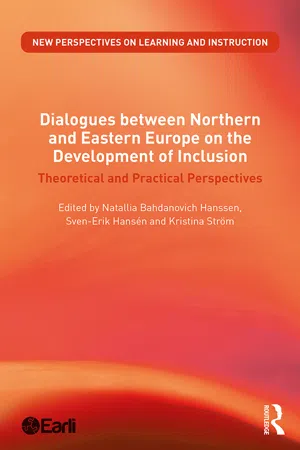
Dialogues between Northern and Eastern Europe on the Development of Inclusion
Theoretical and Practical Perspectives
- 272 pages
- English
- ePUB (mobile friendly)
- Available on iOS & Android
Dialogues between Northern and Eastern Europe on the Development of Inclusion
Theoretical and Practical Perspectives
About This Book
The concepts of inclusion and inclusive education for children with special education needs (SEN) have been widely accepted as imperative undertakings in the education spectrum. This book posits the practice of these ideas by scrutinizing the methodologies adopted by varied nations of the two regions towards inclusive education along with juxtaposing the dichotomous observations to enable a dialogue regarding the actualization of inclusive education.
The book looks at the distinct approaches taken by Northern and Eastern European education systems to realize inclusive education for children with SEN and aims to enable a space for dialogue wherein the reader would be able to access the cultural context of each practice, expand their cognizance regarding the concept of inclusivity and develop a more nuanced and sensitive approach to inclusive education. In the act of exploring the myriad ways in which inclusivity is practiced in the two regions, the book thusly provides insights into the pluralities and significance of inclusion in the education sector across a global spectrum.
The anthology will be of interest to a vast range of audience, videlicet, individuals, students, researchers, professionals, et al., invested in the education sector, special needs education and pedagogy. It further proposes appeal for individuals interested in performing scientific research on the subject. The book practically aims to be of interest for any individual invested in the discipline of education, development of community and the topics pertaining to education for children with SEN.
Frequently asked questions
Information
Table of contents
- Cover
- Endorsements
- Half Title
- Series Page
- Title Page
- Copyright Page
- Table of Contents
- Acknowledgements
- Foreword
- Foreword
- Introduction
- PART I: Theoretical perspectives on inclusion and inclusive education
- PART II: Inclusion and inclusive education in Northern Europe
- PART III: Inclusion and inclusive education in Eastern Europe
- PART IV: Dialogues between Northern and Eastern Europe
- Contributors
- Index